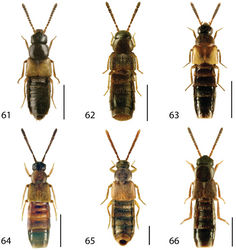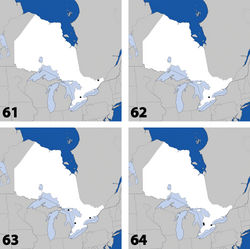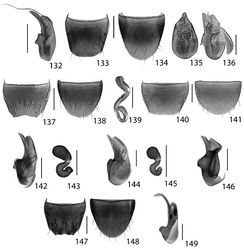Callicerus obscurus
| Notice: | This page is derived from the original publication listed below, whose author(s) should always be credited. Further contributors may edit and improve the content of this page and, consequently, need to be credited as well (see page history). Any assessment of factual correctness requires a careful review of the original article as well as of subsequent contributions.
If you are uncertain whether your planned contribution is correct or not, we suggest that you use the associated discussion page instead of editing the page directly. This page should be cited as follows (rationale):
Citation formats to copy and paste
BibTeX: @article{Brunke2012ZooKeys186, RIS/ Endnote: TY - JOUR Wikipedia/ Citizendium: <ref name="Brunke2012ZooKeys186">{{Citation See also the citation download page at the journal. |
Ordo: Coleoptera
Familia: Staphylinidae
Genus: Callicerus
Name
Callicerus obscurus Gravenhorst, 1802 New Canadian Record – Wikispecies link – Pensoft Profile
Material examined
CANADA: ON:Hamilton Div., Hamilton, 15.v.1985, M. Sanborne, 1 (CNC); Huron Co., Brucefield, hedgerow, pitfall, 11.v.2009, A. Brunke, 1 (DEBU), same data except: 22.vi.2009, 1 (DEBU), Auburn, hedgerow, pitfall, 11.v.2010, A. Brunke, 1 (DEBU).
Distribution
Canada: ON; western Palaearctic (Assing 2001[1]; Gusarov 2003b[2]). Adventive in Canada.
Comments
Callicerus obscurus is recorded from Canada for the first time based on Ontario specimens mostly collected in agricultural hedgerows. Gusarov (2003b)[2] first reported this species from North America in an online catalog of North American Athetini based on specimens collected in Ontario (V. Gusarov, pers. comm). The ‘undescribed Callicerus s.str.’ from Ontario groundhog burrows mentioned by Ashe (in Newton et al. 2000) may in fact be this adventive species. Therefore, all Callicerus in North America may be introduced. Males of Callicerus obscurus are easily recognized by their extremely elongate antennomere 10. In North America, Callicerus obscurus may be separated externally from Callicerus rigidicornis by the more elongate pronotum (Fig. 64).
Callicerus obscurus inhabits open and forested habitats in its native range and was suggested to be largely subterranean by Assing (2001)[1] based on highly seasonal (mostly spring) surface activity and the low numbers of individuals captured in each collection event.
Taxon Treatment
- Brunke, A; Klimaszewski, J; Dorval, J; Bourdon, C; Paiero, S; Marshall, S; 2012: New species and distributional records of Aleocharinae (Coleoptera, Staphylinidae) from Ontario, Canada, with a checklist of recorded species ZooKeys, 186: 119-206. doi
Other References
- ↑ 1.0 1.1 Assing V (2001) A revision of Callicerus Gravenhorst, 1802, Pseudosemiris Machukla, 1935 and Saphocallus Sharp, 1888. Beiträge zur Entomologie 51: 247-334.
- ↑ 2.0 2.1 Gusarov V (2003b) A catalogue of the athetine species of America north of Mexico (Coleoptera: Staphylinidae: Aleocharinae: Athetini).http://nhm.ku.edu/ksem/peet/cata_web.htm [accessed January 2012].
Images
|


